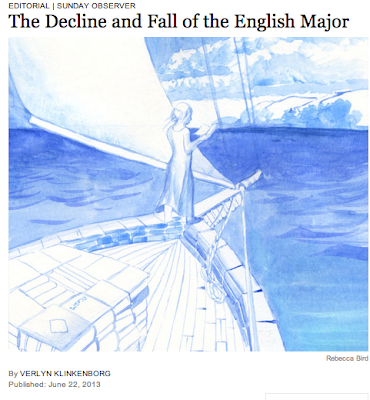Wednesday, June 26, 2013
Thoughtful Thursday-Being an English major
Parents have always worried when their children become English majors. What is an English major good for? In a way, the best answer has always been, wait and see — an answer that satisfies no one. And yet it is a real answer, one that reflects the versatility of thought and language that comes from studying literature. Former English majors turn up almost anywhere, in almost any career, and they nearly always bring with them a rich sense of the possibilities of language, literary and otherwise.
Verlyn Klinkenborg wrote this in his editorial, The Decline and Fall of the English Major, in the New York Times Opinion Pages. He makes a great argument for studying the humanities and in particular its fundamental principle of writing which he says is "about developing a rational grace and energy in your conversation with the world around you."
Studying literature involves both analysis and synthesis. For the first 30 years of my life in the visual arts, I used the analytical skills I had learned as an English major although I didn't see it that way at first. When I started, calligraphy was both a validation of my love of literature and a rejection of the analytical requirements of its study. Even though my early calligraphy was stiff with the painstaking efforts of learning, I was able to pour my affection for the words I loved into each line I wrote. I thought of it as a release from thinking but in fact I had just redirected the thinking to learning calligraphy.
I am pretty much self-taught at what I have done for work in my adult life—calligraphy, bookmaking, graphic design, public speaking, teaching. What I learned as an English major enabled me to do so: how to break down—what is the writer trying to say? how is she saying it?—and build up—working from the word to the sentence to the paragraph to the completed essay. I learned to take a red pen to everything I wrote. Continually reviewing my lettering, bookmaking, teaching, and speaking performances with a metaphorical red pen has allowed me to let my work be my teacher.
Now, after 35 years in the arts, my focus is synthesis. I am bringing together many aspects of my work and honoring all that has come before. When I first moved into visual art, I felt so out of my element, so insecure about not having an art degree, that I gave little credit to the degree I had. It was a surprise, then, when I was preparing my first talk about my art life several years ago, to realize that I approach art like an English major. There is what I have come to call an "aboutness" to literature than there isn't in visual art. One paints a painting of a tree, but one writes about a tree. My largest body of work, The Spirit Books, has no words or images but it is very much about an idea—that there is an invisible world that lies beneath the one we see and that both should be treated with reverence and grace. My interest in working in series comes from my immersion in literature. I didn't read one play by Shakespeare, I read them all. I spent four months with his comedies and another four with his tragedies. I spent a semester reading Edmund Spenser's The Faerie Queen. I came to expect a digging in and a digging down, a sustained exploration of an idea.
My work is, to paraphrase Mr. Klinkenborg, my conversation with the world around me. My impulse to make a life of creative work comes from a deeper and older source than my studies but it was the foundation set by the study of literature that gave me the tools.
Read Verlyn Klinkenborg's essay
Subscribe to:
Post Comments (Atom)






4 comments:
Yes, I think you captured it. It's the ability to combine thoughts of everything that's lacking in a career-focused education that impoverishes the world today.
Well I may have learned to read and write, but the days of the week? I just realized that it is fact Wednesday not Thursday today. I was doing the writing a day ahead and forgot to save or schedule it for tomorrow.
My roommate was an English major and her response to the question - what are you going to do with that? - was always, "well, I speak it a lot."
ah yes Susan, studying the humanities teaches us how to be humane in the very best sense of the word... sensitivity, deep thought, sharing knowledge, graciousness and you & your work have all of these in abundance.
Post a Comment